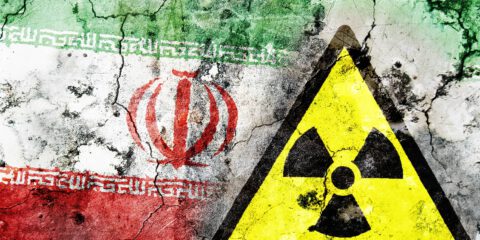The propaganda mouthpieces of the Iranian regime believe that the political disputes in Israel will prevent Israel from reaching a consensus regarding a possible attack on nuclear facilities in Iran.
Since the last Knesset election and the change of government, the Iranian regime has been closely monitoring the process of coalition forming, the behavior of the coalition members, changes in the decision-making process, and the Israeli discourse since the new government took over.
They are also aware of the public conversation on the composition of the government and the changes it promotes. The legal reform and the protests among the various groups in Israel are also receiving intense attention.
In addition, the Iranians follow the policy changes regarding the Palestinian issue and the demands of members of the Israeli government to curtail Palestinian freedom of action in the various regions. They are interested in assessing how far the Iranian issue is from the focus of Israeli attention.
One of the prominent mouthpieces of the Iranian regime that deals intensively with the internal situation in Israel is the website of the Iranian National Security Council, Noor News, which also established a Hebrew-language page for Israeli readers.
In recent months, this site published detailed news about the economic situation, the divisions within Israeli society, and the attitude toward the vulnerable sections to present the Jewish State – per the traditional Iranian narrative – as being vulnerable and as “a country whose parts do not connect.”
The Council is very close to Iranian leader Ali Khamenei. It acts under his instructions, and its publications are approved at the highest level in the Iranian regime.
The second most important means of communication is the established daily Kayhan, also recognized as the leader’s voice and a tool for transmitting his messages in various areas: the nuclear issue, the attitude toward regional developments, and more. The editorial articles in Kayhan on topics such as the threats to close the Strait of Hormuz, the Iranian desire to take over Bahrain, and threats to withdraw from the NPT have always been interpreted as demands or warning messages from the Iranian leader.
Through their publications, whether explicitly or implicitly, those two media outlets try to achieve the following goals:
1) To present the State of Israel as weak and torn by internal disputes. This characterization confirms the vision of the Islamic Revolution, which holds that the disappearance of Israel is an inevitable fate that will come about both due to armed struggle and internal tensions. This message is intended to strengthen Iran’s global allies and its allies in the region, presenting them with a vision of a historic victory (and with religious significance).
2) To generate sympathy among groups in the region and the West who accept the narrative of the “predatory Israeli occupation”; and tag the protests in Israel as another sign of the internal division.
3) To muffle and weaken the threats of attacks by Israel and its allies against the nuclear installations and the long-range missiles project. Amid an internal crisis, the regime needs to generate self-conviction, fortify internal cohesion, and project an image of strength in the face of the external threat (this effort was reflected, among other ways, in attempts to downplay the damage caused by an attack in Isfahan). This image allows the continuation of the nuclear project without fear.
4) Compare the public protests in Iran with those in Israel, implying that the former is fading and failing, intensifying the rift in Israel.
Khamenei claimed in Kayhan (February 6) that the current protests in Israel are different from earlier ones. “For many weeks now, tens of thousands of residents of the occupied territories [the Iranian regime sees all Palestine, from the sea to the river, as occupied territory] have demonstrated against Netanyahu’s dictatorial and fascist government.”
Khamenei attaches importance to these protests in many cities across Israel and not only in Tel Aviv, probably in response to the West closely following the scale of protests in Iran. The newspaper indicates that the Israeli demonstrators carried signs such as “Netanyahu’s government is dangerous to world peace.”
Protests in Israel encompass lawyers, labor unions, and many sectors, which, despite political differences, are united in their opinion that the Netanyahu government is dangerous. Pilots, doctors, students, and workers demonstrate together, increasing the feeling that civil war will soon break out.
These demonstrations created paralysis in Netanyahu’s Zionist government because it is torn between the protesters and its extremist members, like Itamar Ben-Gvir, who are dissatisfied with Netanyahu’s weak performance on the Palestinian issue. The extremists in the Netanyahu government may bring its fall in a few months. Netanyahu and his friends have exacerbated the situation so much as a Zionist pilot threatens to kill him.
The daily also quoted (January 31) the words of former prime minister Ehud Barak, who said that “Israel may not reach the age of 80 because it is slowly turning into a powder keg.” According to the Iranian regime, this statement stems from the ever-increasing protests against Netanyahu’s new government and the failure of the iron-fist policy against the Palestinian population and the opposing currents within it. Every day, the Zionists encounter operations by brave Palestinians who are not afraid to die. That led the new National Security Minister Ben-Gvir to threaten the Palestinians with the death penalty by electric chair and to destroy their homes.”
In parallel, the Noor News website focused on the controversy surrounding the promotion of legal reform in Israel. It published an article (January 16) under the title “Significant decline in Zionist confidence in the future of the Hebrew state,” in which it emphasized that “against the background of the criticism from the widespread demonstrations directed against him and his government, the prime minister of the occupation, Binyamin Netanyahu, said that millions of Zionists voted in favor of ongoing reforms to the justice system, while President Herzog said he was working behind the scenes to prevent a historic rift between the Zionists and is calling for a quick elimination of the state of weakness that has afflicted the country.”
Also, the site refers to what is known as the “annual optimism” index issued by the Israel Democracy Institute (IDI). According to an IDI poll, most Israelis do not trust their public institutions, and only 49% trust the country’s future. It explains that the “Zionist regime” imposed institutions on the Jews (not a people but a religious sect).
In the article under the title “There is no such thing as left-wing, central or right-wing in the Israeli government,” the website editor of Noor News wrote (January 20) of the Iranian National Security Council in Hebrew that “it does not matter who is the leader of any new Israeli government and what is the ideology of that government, the Israeli occupation will always be based on a system of colonialism and settlers.” According to the article, “it will continue to be so no matter what until the liberation of Palestine.”
Implications for Israeli policy
Iran’s delegitimization efforts against Israel and the attempt to exploit the differences of opinion and protests in Israel to further anti-Israeli positions in the domestic and international arenas oblige the Israeli government to broadcast (in deed and via messages) that the internal discourse does not detract from its ability to act to protect vital interests, in partnership with the US and other countries in the region or on its own. No matter how harsh they may be, demonstrations and public discourse are not illegal, as protests against tyranny in a regime that is not democratic – a distinction absent from the Iranian propaganda line.
Continuation of the effort to harness international bodies to condemn the Iranian anti-Israeli discourse is needed. An important message should be Iran’s brutal violation of human rights against its citizens during the recent protests. So too, is bringing to the attention of the Western world Iran’s subversive activity against the Western countries in helping Russia destroy infrastructure and kill civilians in Ukraine.
JISS Policy Papers are published through the generosity of the Greg Rosshandler Family.
Photo: IMAGO / APAimages









 - בניית אתרים
- בניית אתרים